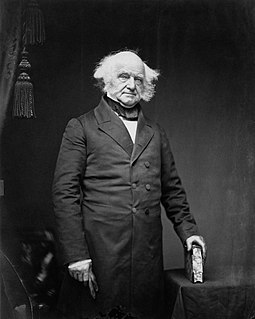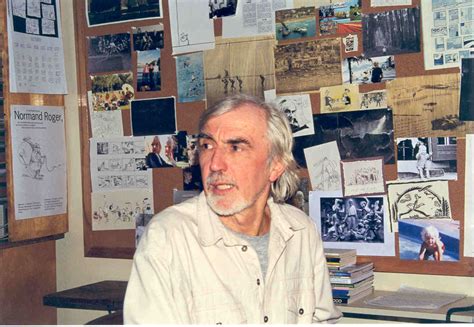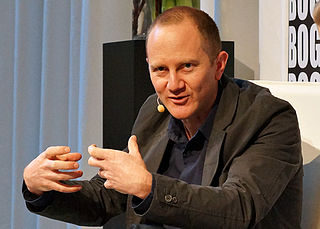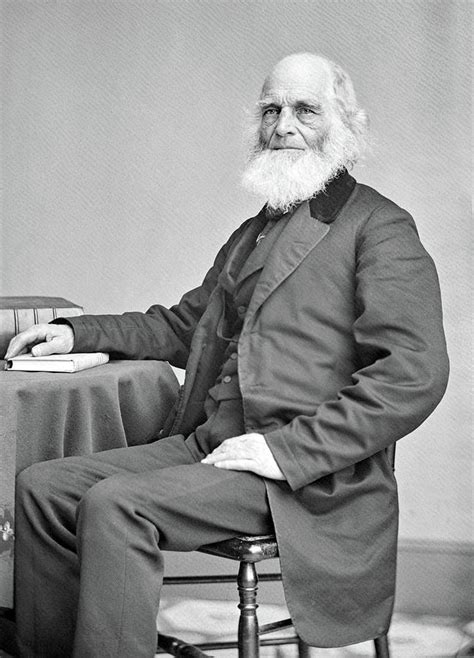Top 245 Crops Quotes & Sayings - Page 4
Explore popular Crops quotes.
Last updated on April 18, 2025.
Something is fundamentally amiss when you refer to a person as illegal. Bottom line. That's why we so easily talk about this like we're talking about plants or crops. These illegals. My God, man, it's so tragic to me traveling around this country, this country that is getting more and more Latino, and you hear people use the words "illegal" and "Mexican" interchangeably. Interchangeably. Without blinking an eye.
As to the latter point - that by having a child in America you are somehow starving a child in Bangladesh - remember that agricultural economics is not a zero-sum game. Farmers want to make a living, so as demand increases, so does production. Not only that, but agricultural productivity has increased so rapidly that in some countries the government pays farmers not to plant crops in an effort to keep food prices from dropping.
If I wasn't acting, I would own a farm. Not like growing crops but maybe have a few animals like cows, and maybe an alpaca or a llama. I would chop wood all day. I would make a living doing that; it's, like, an idealistic scenario for me. It's very contrary to my upbringing, but maybe that's the appeal to it.
America need a significantly changed taxation system. And the one that I've advocated is based on tithing, because I think God is a pretty fair guy. If you give me a tithe, it doesn't matter how much you make. If you've had a bumper crop, you don't owe me triple tithes. And if you've had no crops at all, you don't owe me no tithes. So there must be something inherently fair about it.
One of the skills of a journalist, though, is to find people who can teach him what he needs to know. So instead of taking courses, I've been very lucky in that I found teachers - scientists, especially - who were willing to teach me what I needed to know, whether it was about genetically modified crops or how photosynthesis works, and so on. I just find my teachers and don't have to pay for my education.
The measure discriminates definitely against products which make up what has been universally considered a program of safe farming. The bill upholds as ideals of American farming the men who grow cotton, corn, rice, swine, tobacco, or wheat and nothing else. These are to be given special favors at the expense of the farmer who has toiled for years to build up a constructive farming enterprise to include a variety of crops and livestock.
Railroad carriages are pulled at the enormous speed of fifteen miles per hour by engines which, in addition to endangering life and limb of passengers, roar and snort their way through the countryside, setting fire to the crops, scaring the livestock, and frightening women and children. The Almighty certainly never intended that people should travel at such break-neck speed.
If there is no struggle, there is no progress. Those who profess to favor freedom, and yet depreciate agitation, are men who want crops without plowing up the ground. They want rain without thunder and lightning. They want the ocean without the awful roar of its many waters. This struggle may be a moral one; or it may be a physical one; or it may be both moral and physical; but it must be a struggle.
We're still promoting stupid wasteful behavior in agribusiness - everything from ethanol production for cars to genetically modified crops. In commerce just about everything we do politically is in the service of WalMart and the systems tied to it. In transportation, we could, for instance, have compelled General Motors to produce railroad rolling stock as a condition of their bail-out, but we didn't do that. Instead, we're chasing the phantom of electric cars - and, believe me, we are going to be mortally disappointed how that works out.
Will biofuel usage require land? Absolutely, but we think the ability to use winter cover crops, degraded land, as well as using sources such as organic waste, sewage, and forest waste means that actual land usage will be limited. Just these sources can replace most of our imported oil by 2030 without touching new land.
Regard the heart as a vast field. Use the mind as a plough. Treat the gunas (qualities) as bullocks. Use the intelligence (Viveka) as a whip. With these aids, cultivate the field of your heart. What is the crop that is to be grown in it? Sathya, Dharma, Santhi and Prema are the crops. Bhakthi is the rain, meditation is the manure, Brahmananda is the crop.
When the words are fuzzy, the programmers reflexively retreat to the most precise method of articulation available: source code. Although there is nothing more precise than code, there is also nothing more permanent or resistant to change. So the situation frequently crops up where nomenclature confusion drives programmers to begin coding prematurely, and that code becomes the de facto design, regardless of its appropriateness or correctness.
I've come from a very masculine country to a feminine country. England was very masculine; people went from England to abroad, and they landed from above and they said "These are the gods you will worship, these are the crops you will grow, now go away and do it." Which is a manly attitude. Americans go abroad and they say, "Try not to quarrel so much", which is a feminine attitude.
If you go to Italy and you drive from the airport to the town, there isn't 30 square feet that isn't planted by someone. Even next to the train tracks, they see the joy of the interaction with the planet as integral to the experience. The idea that you can get free arugula just by planting seeds... because it will regrow itself the next year. We've come a long way from foraging to now planting. The next step of that will be continuing that expansion of planting and really owning the crops.
Growing up in Georgia, my dad was a farmer and we worked in agriculture, so we were always looking up at the sky, checking if rain was in the forecast. That always set the tone for the mood in my household, whether we had rain coming in or not - we knew the crops would be good and it was going to be a good week around the Bryan household.
The dialectical or ecological approach asserts that creating the world is involved in our every act. It is impossible for us to operate in our daily lives and not create the world that everyone must live in. What we desire arranges the genetic code in all of our major crops and livestock. We cannot avoid participating in the creation, and it is in agriculture, far and away our largest and most basic artifact, that human culture and the creation totally interpenetrate.
When the Labor Department is forced to relent and let these visitors do this work it is of course all legal. But it makes one wonder about the illegal alien fuss. Are great numbers of our unemployed really victims of the illegal alien invasion or are those illegal tourists actually doing work our own people won't do? One thing is certain in this hungry world; no regulation or law should be allowed if it results in crops rotting in the field for lack of harvesters.
Our ingenuity in feeding ourselves is prodigious, but at various points our technologies come into conflict with nature's ways of doing things, as when we seek to maximize efficiency by planting crops or raising animals in vast mono-cultures. This is something nature never does, always and for good reasons practicing diversity instead. A great many of the health and environmental problems created by our food system owe to our attempts to oversimplify nature's complexities, at both the growing and the eating ends of our food chain.
It is surely a matter of common observation that a man who knows no one thing intimately has no views worth hearing on things in general. The farmer philosophizes in terms of crops, soils, markets, and implements, the mechanic generalizes his experiences of wood and iron, the seaman reaches similar conclusions by his own special road; and if the scholar keeps pace with these it must be by an equally virile productivity.
I foresee the time when industry shall no longer denude the forests which require generations to mature, nor use up the mines which were ages in making, but shall draw its raw material largely from the annual produce of the fields. I am convinced that we shall be able to get out of yearly crops most of the basic materials which we now get from forest and mine.
The first western gardens were those in the Mediterranean basin. There in the desert areas stretching from North Africa to the valleys of the Euphrates, the so-called cradle of civilization, where plants were first grown for crops by settled communities, garden enclosures were also constructed. Gardens emphasized the contrast between two separate worlds: the outer one where nature remained awe-inspiringly in control and an inner artificially created sanctuary, a refuge for man and plants from the burning desert, where shade trees and cool canals refreshed the spirit and ensured growth.
The Framers of the First Amendment were not concerned with preventing government from abridging their freedom to speak about crops and cockfighting, or with protecting the expressive activity of topless dancers, which of late has found some shelter under the First Amendment. Rather, the Framers cherished unabridged freedom of political communication.
It's risky to allow radiation to constantly go up into the atmosphere. The main criticism of this approach of entombing it is that it would cost too much, involve too many resources and people. But think of the cost of having all the crops impounded by the government, all the milk being thrown into the river, people's livelihoods destroyed.
as a physician I examine the dying planet as I do a dying patient. The earth has a natural system of interacting homeostatic mechanisms similar to the human body's. If one system is diseased, like the ozone layer, then other systems develop abnormalities in function - the crops will die, the plankton will be damaged, and the eyes of all creatures on the planet will become diseased and vision impaired.
If you say, Well, OK, I don't believe in God. There's no evidence of God, then you're missing the stars in the sky and you're missing the sunrises and sunsets and you're missing the fact that bees pollinate all these crops and keep us alive and the way that everything seems to work together. Everything is sort of built in a way that to me suggests intelligent design.
In Sherman's famous march through Georgia, his soldiers left a swath of death and destruction, destroying crops, burning homes and killing civilians. Sherman himself acknowledged that only 20% of the destruction inflicted by his invasion was inflicted on military objectives. Civilian non-combatants, essentially innocents, suffered 80% of the losses.
Most comics are not truly rebellious or creatively free. Most comics, paintings, music, etc., are derivative of other, more successful works. And it's quite often that those without much rebellious spirit are the ones to imitate it. Genuine radical expression is hard to come by, but it usually crops up when money is not a motivating factor. You can take all the liberties you want when someone else's dime is not at stake. The validation is not a threat to comics. A far greater threat to the creative freedom of artists working in any medium is self-consciousness and self-censorship.
Climate change is directly related to the growth of terrorism. And if we do not get our act together and listen to what the scientists say, you're going to see countries all over the world struggling over limited amounts of water, limited amounts of land to grow their crops ask you're going to see all kinds of international conflict.
The traditional farm, the peanuts, the cotton, the corn, is probably not the thing to do, because you're up against big farmers who can afford all the equipment to grow those kinds of crops. But we need healthy food. We're being encouraged to eat more vegetables. Our school systems are being encouraged to buy locally. So, we need farmers who can produce that food.
Creation was given to people as a clean window through which the light of God could shine into people's souls. Sun and moon, night and day, rain, sea, the crops, the flowering tree, all these things were transparent. They spoke to people not of themselves but only of Him who made them. Nature was symbolic. But the progressive degradation of humans led them further and further from this truth. Nature became opaque.
I'm amazed at how much my writing is improved when I step away from the computer, even in small amounts. If I'm stuck, I vacuum the living room or walk the dog. I'm amazed at what comes out of that... We have to realize that part of the writing life where we're sitting down at the computer is harvesting the crops, but you have to have planted them and watered them and created fertile soil - and that's a life.
Raising crops to feed animals for human consumption requires a lot of land. It takes eight or nine cows a year to feed one average meat eater; each cow eats one acre of green plants, soybeans and corn per year; so it takes eight or nine acres of plants a year to feed one meat eater, compared with only half an acre to feed one vegetarian.
Contact with [menstrual blood] turns new wine sour, crops touched by it become barren, grafts die, seed in gardens are dried up, the fruit of trees fall off, the edge of steel and the gleam of ivory are dulled, hives of bees die, even bronze and iron are at once seized by rust, and a horrible smell fills the air; to taste it drives dogs mad and infects their bites with an incurable poison.
Just as plagues were visited on Pharaoh so will pestilences and disasters be visited on the white man. Why, it has already started: God has begun to send them heat when they expect cold; he sends them cold when they expect heat. Their crops are dying, their children are being born with all kinds of deformities, the rivers and lakes are coming out of the belly of the earth to wash them away.
One of the problems is that the US government supports unhealthy food and does very little to support healthy food. I mean, we subsidize high fructose corn syrup. We subsidize hydrogenated corn oil. We do not subsidize organic food. We subsidize four crops that are the building blocks of fast food. And you also have to work on access. We have food deserts in our cities. We know that the distance you live from a supplier of fresh produce is one of the best predictors of your health.
From wherever the emissions come, they have the same effect: They trap much more heat from the sun, melt the ice, raise the sea level, cause stronger storms, floods, drought, bigger fires, generate millions of climate refugees, destabilize political systems, threaten the growing of food crops and cause a number of other catastrophic consequences which, taken together, threaten the basis for the future of human civilization on the Earth.
Who knows better than a peasant farmer the agricultural conditions in his country or region? It is not always necessary to send an FAO expert to tell him what crops to grow or what seeds to use. Give him the seeds he asks for, and he will do the rest. Don't tell him how to renovate his irrigation system: give him the necessary equipment and he will do the job far better than us.
What a difference that extra 120 ppm has made for plants, and for animals and humans that depend on them. The more carbon dioxide there is in the atmosphere, the more it is absorbed by plants of every description - - and the faster and better they grow, even under adverse conditions like limited water, extremely hot air temperatures, or infestations of insects, weeds and other pests. As trees, grasses, algae and crops grow more rapidly and become healthier and more robust, animals and humans enjoy better nutrition on a planet that is greener and greener.
...As the disparity between the rich and the poor grows, the fight to corner resources is intensifying. To push through their "sweetheart deals," to corporatize the crops we grow, the water we drink, the air we breathe, and the dreams we dream, corporate globalization needs an international confederation of loyal, corrupt, authoritarian governments in poorer countries to push through unpopular reforms and quell the mutinies. Corporate Globalization-or shall we call it by its name?-Imperialism-needs a press that pretends to be free. It needs courts that pretend to dispense justice.
It's worse than slave trade because what is being traded is the very knowledge that makes survival possible for 80 percent of the people of this world. These 80 percent live on the biodiversity and the knowledge they have evolved as part of a rich collective heritage involving the use of seeds for growing crops and medicinal plants for healing.
When I reached Fort Binjemma, for example, where my grandfather was stationed for a while, the whole Victorian fort was decaying. Barbed wire surrounded it, spray paint on the ancient walls claimed it as private property, and the moat where my grandfather and his men had grown crops - in desperation as the siege's hunger bit - was completely overgrown with bushes and trees.
What is essential to practice the Tao is to get rid of cravings and vexations. If these afflictions are not removed, it is impossible to attain stability. This is like the case of the fertile field, which cannot produce good crops as long as the weeds are not cleared away. Cravings and ruminations are the weeds of the mind; if you do not clear them away, concentration and wisdom do not develop.
Are we going to take the hands of the federal government completely off any effort to adjust the growing of national crops, and go right straight back to the old principle that every farmer is a lord of his own farm and can do anything he wants, raise anything, any old time, in any quantity, and sell any time he wants?
Here in the United States, a study of nearly 700 women in California showed an increased risk of fetal death among babies whose mothers lived near crops when certain pesticides were sprayed. The largest risks were found among pregnant women exposed during the critical first trimester and among those who lived in the same square mile where pesticides were used.
We're going to move from a commodity economy where you basically grow the same kind of crops - where a kernel of corn is a kernel of corn is a kernel of corn - to an ingredient economy where there will be a kernel of corn that will be designed for fuel, there will be a kernel of corn designed for livestock.
Then the angel showed me the river of the water of life, as clear as crystal, flowing from the throne of God and of the Lamb down the middle of the great street of the city. On each side of the river stood the tree of life, bearing twelve crops of fruit, yielding its fruit every month. And the leaves of the tree are for the healing of the nations.
I respect not his labors, his farm where everything has its price, who would carry the landscape, who would carry his God, to market, if he could get anything for him; who goes to market for his god as it is; on whose farm nothing grows free, whose fields bear no crops, whose meadows no flowers, whose trees no fruits, but dollars.
Even in our own agriculture strategy, if we got a great new drought-resistant seed and we managed to get it distributed in the system, we just assumed that it would reach female farmers. That's a false assumption, because women don't interact with agro-dealers. So if you don't develop specific programming to ensure that seed gets in a woman's hands, then the extra income [generated by higher-yielding crops] goes into her husband's hands.
A silence, the brief Sabbath of an hour,
Reigns o'er the fields; the laborer sits within
His dwelling; he has left his steers awhile,
Unyoked, to bite the herbage, and his dog
Sleeps stretched beside the door-stone in the shade.
Now the gray marmot, with uplifted paws,
No more sits listening by his den, but steals
Abroad, in safety, to the clover-field,
And crops its juicy-blossoms.
The first big effects will be farmers that live on the edge. Today's weather, they barely get by. Their kids, a high percentage are malnourished, and so if you impose more variable weather and more heat, you're getting more floods, more droughts, and during the germination time, the high heat, most crops...do poorly when there's more heat.
My sense is that the most under-appreciated-and perhaps most under-researched-linkages between forests and food security are the roles that forest-based ecosystem services play in underpinning sustainable agricultural production. Forests regulate hydrological services including the quantity, quality, and timing of water available for irrigation. Forest-based bats and bees pollinate crops. Forests mitigate impacts of climate change and extreme weather events at the landscape scale.
I used to help my grandfather on the farm, driving tractors, raising crops and animals. I used to feed some of the baby cows and pigs, and I had to be no older than 7 or 8. Then at about 9 or 10 I started driving tractors. It showed me at an early age what hard work was all about and how dedicated you have to be, no matter what you do.
We seem to forget that everything that is good for the environment is a job. Solar panels don't put themselves up. Wind turbines don't manufacture themselves. Houses don't retrofit themselves and put in their own new boilers and furnaces and better-fitting windows and doors. Advanced biofuel crops don't plant themselves. Community gardens don't tend themselves. Farmers' markets don't run themselves. Every single thing that is good for the environment is actually a job, a contract, or an entrepreneurial opportunity.
In the old days of America when communities were separated by hundreds of miles, why were they able to thrive? Because if it was harvest time and the farmer was up in the tree picking apples and fell down and broke his leg, everybody pitched in and harvested his crops for him. If somebody got killed by a bear, everybody took care of their family.
A man cannot free himself by any self-denying ordinances, neither by water nor potatoes, nor by violent possibilities, by refusing to swear, refusing to pay taxes, by going to jail, or by taking another man's crops or squatting on his land. By none of these ways can he free himself; no, nor by paying his debts with money; only by obedience to his own genius.























































